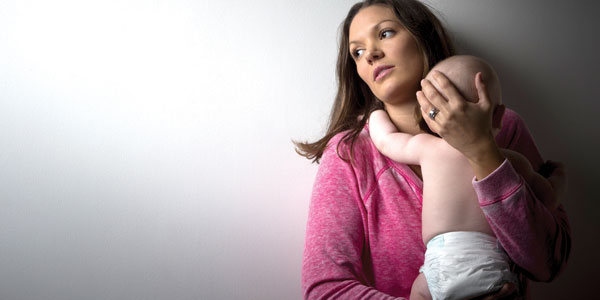
La depresión postparto (PPD) se ha convertido común entre las mujeres.
Solamente en los Estados Unidos, más de 3 millones de mujeres han sufrido de PPD. Su prevalencia se cree que por cuidar de un recién nacido es físicamente y emocionalmente exigente – y puede ser abrumador para cualquier individuo. PPD puede afectar a cualquier madre, siendo una madre primeriza o una madre con varios hijos.
Según los “Hechos de Depresión Postparto” del Instituto Nacional de Salud Mental (NIMH), los niveles hormonales de estrógeno y progesterona en el cuerpo de una mujer bajan rápidamente después del nacimiento, provocando cambios químicos en el cerebro. Como resultado, una mujer puede experimentar cambios de humor – un síntoma general del PPD.
Los síntomas físicos también pueden estar presentes en una mujer que experimenta de PPD. Por ejemplo, como señala el NIMH, la privación del sueño puede causar “molestias físicas” para la madre, incluyendo agotamiento, dolores de cabeza y dolor muscular. Otros síntomas de PPD pueden incluir llorando, una pérdida o aumento de la aptitud, dificultad para concentrarse, incapacidad para cuidar al bebé, se adapta de ira o rabia y retirarse o evitar familiares o amigos.
Sin embargo, si hay algún ser querido que demuestra uno o más de los síntomas de PPD, se aconseja no precipitarse a sacar conclusiones. PPD sólo se puede diagnosticar por un profesional de la salud certificado.
Para más información general sobre PPD, visita www.nihm.gov/health/publications/postpartum-depression-facts/index.shtml.
_________________________________________________________________________________________________________________
What to expect from postpartum depression
By Katherine Diaz
Postpartum depression (PPD) has become common among women.
More than 3 million women in the United States alone experience PPD. Its prevalence is believed to be because taking care of a newborn is physically and emotionally demanding – and can be overwhelming for any individual. PPD can affect any mother, whether she’s a new mother or a mother with multiple children.
According to the National Institute of Mental Health’s (NIMH’s) “Postpartum Depression Facts,” the hormonal levels of estrogen and progesterone in a woman’s body rapidly drops following birth, thus causing chemical changes in the brain. As a result, a woman may experience mood swings – a general symptom of PPD.
Physical symptoms also might be present in a woman experiencing PPD. For example, as the NIMH states, sleep deprivation can cause “physical discomforts” for the mother, including exhaustion, headaches and muscle pain. Other symptoms of PPD might include crying, a loss or increase of aptitude, trouble concentrating, an inability to care for the infant, fits of anger or rage and withdrawing from or avoiding family or friends.
However, anyone who notices a loved one demonstrating one or more of the symptoms of PPD is advised to not rush to conclusions. PPD can be diagnosed only by a certified healthcare professional.
For more general information on PPD, visit www.nihm.gov/health/publications/postpartum-depression-facts/index.shtml.










